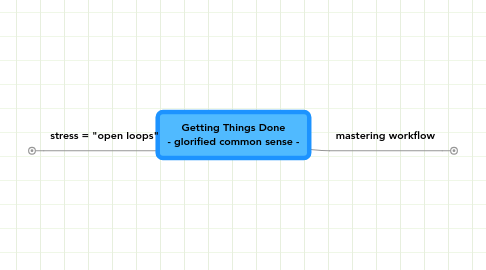
1. stress = "open loops"
1.1. Def.
1.1.1. "open loops" = improperly managed commitments made or accepted
1.2. Ex.
1.2.1. Make every real estate developer in Romania build green
1.2.2. Replace flipchart paper
1.2.3. Respond to EMAIL
1.3. how to deal?
1.3.1. get things OFF your mind
1.3.1.1. if it's on your mind, your mind isn't clear
1.3.1.1.1. use collection buckets
1.3.1.1.2. sort collection buckets
1.3.1.2. clarify next action
1.3.1.3. keep reminders in a system that you review regularly
1.3.2. EXERCISE
1.3.2.1. think
1.3.2.2. clarify next action
1.3.2.2.1. if this were the only thing on my plate, what would be the next physical action I would take to make this go forward?
1.3.2.3. what's the effect now?
1.3.2.3.1. why?
1.3.3. why?
1.3.3.1. the mind is very very stupid in dealing with CONTEXTS
1.3.3.1.1. Ex.
1.3.3.2. thinking about things out of context is very tiring
1.3.4. the transformation of STUFF
1.3.4.1. most to-do lists are STUFF
1.3.4.1.1. "Boy, that was an amorphous blob of undoability!"
1.3.4.2. STUFF = anything that you've allowed in your world (physical, mental), that doesn't belong where it is, but for which you haven't yet determined the desired outcome and next action step
1.3.4.3. stuff is how things show up - it's our work to transform it
1.3.4.3.1. after that, it's all about CRANKING WIDGETS (merely physical labor)
1.3.5. managing action
1.3.5.1. NOT
1.3.5.1.1. managing time
1.3.5.1.2. managing information
1.3.5.1.3. managing priorities
1.3.5.2. the only thing you CAN manage these is by managing your actions
1.3.5.3. you can't DO a project
1.3.5.4. bottom-up approach
1.3.5.4.1. start with the most mundane, ground-floor level of current activity and commitments
1.3.5.4.2. once you clear the mundane away, you can think at a high, visionary level
1.3.6. keys
1.3.6.1. get things out of your head
1.3.6.1.1. everything
2. mastering workflow
2.1. five stages
2.1.1. Collect
2.1.1.1. 100% of the open loops
2.1.1.1.1. sources of open loops
2.1.1.1.2. how to identify "open loops"?
2.1.1.1.3. collection bucket tools
2.1.1.1.4. success factors
2.1.2. Process
2.1.2.1. gets you from stuff in buckets to organized actions
2.1.2.2. item-by-item
2.1.2.3. you can't organize stuff before you process it
2.1.2.3.1. you can only organize actions - what needs to be done
2.1.2.4. workflow:
2.1.2.4.1. FLIPCHART
2.1.2.5. primer on determining NAs
2.1.2.5.1. absolute next physical action
2.1.2.5.2. it must be something you can actually act on NOW, if you had the time
2.1.2.5.3. these are NOT NAs
2.1.2.5.4. USE the 2-min rule...
2.1.2.5.5. NA verbs
2.1.3. organize
2.1.3.1. from processing, we get the "outer ring"
2.1.3.1.1. non-actionable
2.1.3.1.2. actionable
2.1.3.1.3. all of these buckets have to have "hard edges"
2.1.3.2. CHECKLISTS
2.1.4. review
2.1.4.1. most of the magic is here
2.1.4.2. WEEKLY
2.1.4.2.1. why?
2.1.4.2.2. how to do this?
2.1.4.2.3. how long?
2.1.4.3. short one - daily
2.1.4.3.1. calendar
2.1.4.3.2. next action list
2.1.4.3.3. maybe, project list
2.1.5. do
2.1.5.1. three possible models for making action decisions
2.1.5.1.1. four-criteria model for choosing actions in the moment
2.1.5.1.2. threefold model for evaluating daily work
2.1.5.2. at any moment, you need
2.1.5.2.1. to decide what you'll DO
2.1.5.2.2. to decide what you will NOT DO
2.1.5.2.3. feel good about your decisions
2.1.5.3. CRANCKING WIDGETS
2.2. don't we do this anyway?
2.2.1. yes, but any weak link breaks the system
2.2.2. trying to do all the stages at once = tremendous drain on energy
2.3. how to get here?
2.3.1. choose the simplest system you can get away with
2.3.1.1. paper!
2.3.1.1.1. notebook
2.3.1.1.2. cards
2.3.1.2. computer?
2.3.1.2.1. MS Outlook = noooooo!
2.3.1.2.2. options?
2.3.2. set up the system
2.3.2.1. physical space
2.3.3. set aside a good period of time to gather all of your open loops
